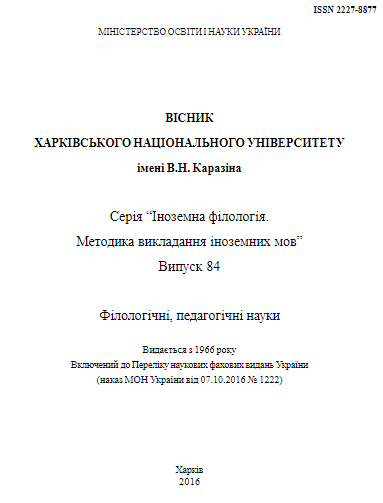Passage as a structural component of ideation speech
Abstract
The article provides the results of linguistic and cognitive analysis of structural components of the ideation speech viewed as a time-limited verbal and non-verbal performance of the ideator addressing the audience (recipients), directly or indirectly included into the situation of communication. The strategic communicative goal of an ideation speech is to implement some idea into social practice by exerting influence on the recipients. An ideation speech is structured in terms of passages,
i.e. speech fragments characterised by a specific type of narration and also lexical and grammatical homogeneity. The results of linguistic and cognitive analysis prompt the classification of an ideation speech passages into implicit/explicit persuading and implicit/explicit urging. Implicit persuading/urging passages contain neither direct persuading nor urging and exert the influence on the recipients by telling a life story (narrative passages) or describing the state of affairs (descriptive passages), serving as an indirect proof of the idea relevance and an indirect urging to get involved in implementation of the idea into social practice. Explicit persuading/implicit urging passages involve explicit persuading of the idea relevance by informing about the state of affairs (informative passages), rational argumentation (argumentative passages) or expressing one“s attitude to the state of affairs (declarative passages) but they do not contain direct urging. Explicit urging/implicit persuading passages (imperative passages) contain direct urging to get involved in implementation of the idea into social practice but they convince in the relevance of the idea only indirectly.
Downloads
References
Выготский Л.С. Мышление и речь / Л.С. Выгот-ский ; [изд. 5, испр.]. – М. : Лабиринт, 1999. – C. 78–84.
Гуссерль Э. Логические исследования. Т. 2. / Э. Гуссерль. – М. : ДИК, 2001. – 529 c.
Ільченко М.Л. Гендерна специфіка стратегій комунікативного домінування в американських передвиборчих теледебатах : дис. … канд. філол. наук. : 10.02.04 / М.Л. Ільченко. – Х., 2013. – 253 c.
Кибрик А.А. Анализ дискурса в когнитивной перспективе : диссертация в виде научного доклада, составленная на основе опубликованных работ, представленная к защите на соискание учен. степ. докт. филол. наук : 10.02.19 / А.А. Кибрик. – М., 2003. – 90 с.
Кибрик А.А. Модус, жанр и другие параметры классификации дискурсов / А.А. Кибрик // Вопросы языкознания. – 2009. – № 2. – С. 3–21.
Макаров М.Л. Основы теории дискурса / М.Л. Макаров. – М. : ИТДГК «Гнозис», 2003. – 280 с.
Мартинюк А.П. Дискурсивний інструментарій аналізу англомовної реклами / А.П. Мартинюк // Лінгвістика ХХІ століття: нові дослідження і перспективи. – 2009. – Вип. 3. – С. 159–167.
Стернин И.А. Введение в речевое воздействие / И.А. Стернин. – Воронеж : ВГУ, 2001. – 252 с.
Философия: энциклопедический словарь / [под. ред. А.А. Ивина]. – М. : Гардарики, 2004. – 1072 с.
Brewer W.F. Literary theory, rhetoric, stylistics: Implications for psychology // R.J. Spiro, B.C. Bruce, & W.F. Brewer (Eds.). Theoretical issues in reading comprehension. – Hillsdale, NJ : Erlbaum, 1980. – P. 221–239.
Chafe W. Integration and involvement in speaking, writing, and oral literature / W. Chafe // Spoken and written language:Exploring orality and literacy (ed. D. Tannen). – Norwood : Ablex, 1982. – P. 35–54.
Decker E.R. Patterns of exposition / E.R. Decker. – Boston : Little Brown and Co., 1978. – 424 p.
Fillmore Ch.J. Frame semantics / Ch.J. Fillmore // Linguistics in the morning calm: Selected papers from the SICOL-1981. – Seoul : Hanship, 1982. – P. 111–137.
Graesser A.C. Implicit knowledge, question answering, and the representation of expository text / A.C. Graesser, S.M. Goodman // B. Britton & J.B. Black (eds.). Understanding expository text. – Hillsdale, N.J. : Erlbaum, 1985. – Р. 142–145.
Graham D. Ideation: The birth and death of ideas / D. Graham, T.T. Bachmann. – Hoboken, NJ : John Wiley & Sons, 2004. – 240 р.
TED: Ideas worth spreading [Електронний ресурс]. – Режим доступу : https://www.ted.com.




